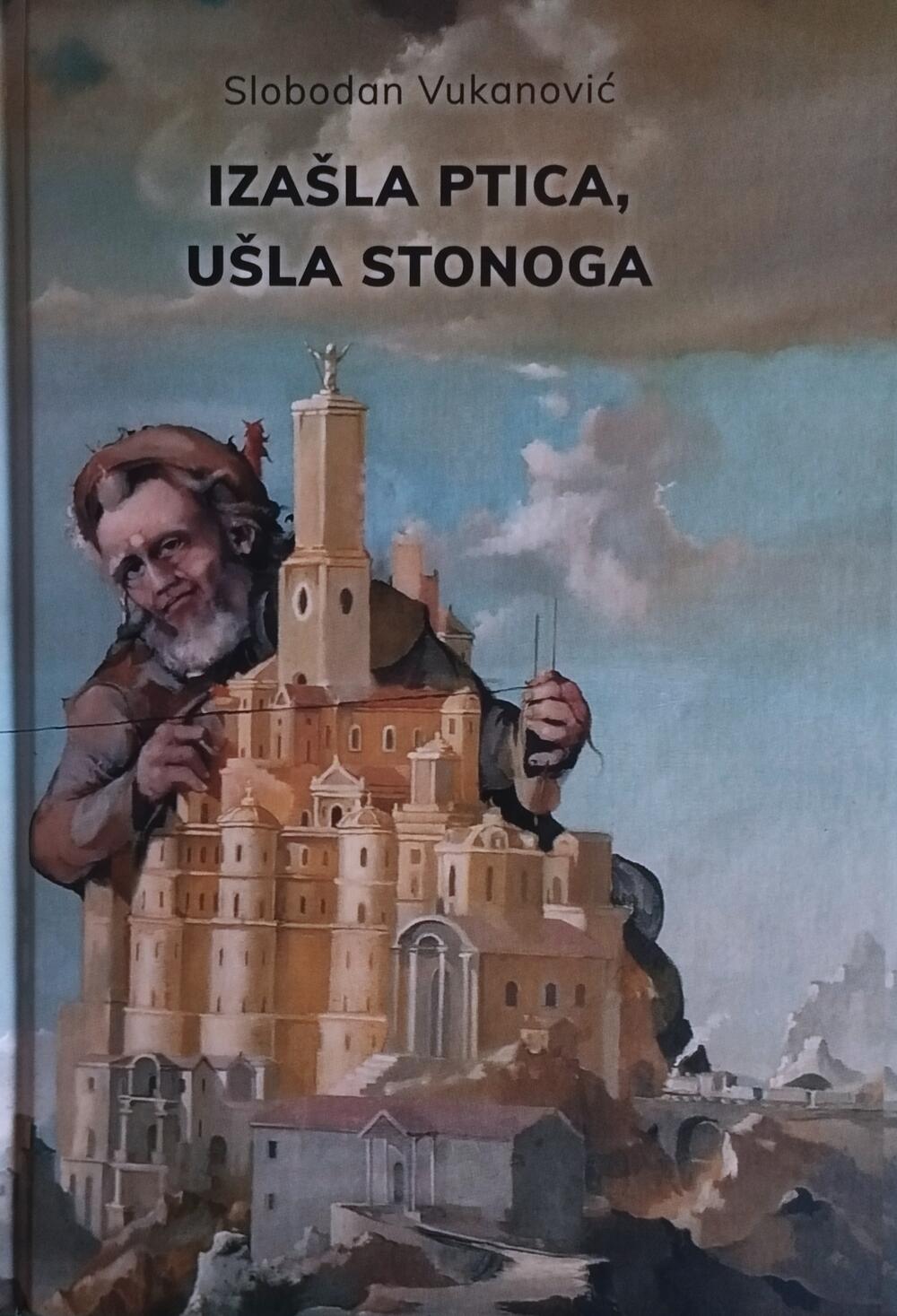Literary work Slobodan Vukanović (1944) represents a kind of phenomenon, as much for the variety of topics, from fairy tales to historical, traditional, fantastic, epic or scientific, as for the approach that raises the reader's "horizon of expectations" to a higher level compared to the traditional attitude of writers towards all recipients.
This was written by prof. Ph.D Sofija Kalezić in the review of the latest book by Slobodan Vukanović, "The bird went out, the centipede came in", which was recently published by the Montenegrin Cultural Forum from Cetinje.
The unique manuscript, which collects short stories, poetry, memories and dedications, is also specific in that it was published in the year when the author celebrates half a century of literary creativity. A kind of feat equal to the most successful writers in world literature gains significance only when it is placed in the Montenegrin, and even regional, context, which, both socially and politically, as well as culturally and artistically, is accompanied by different circumstances, periods, transitions, and challenges. ..
"Persistence in literature is like being let into the arena, then persevere, fight for position and territory. You fight for air, for food, for movement. Sometimes slowly, sometimes faster, you will stand still. Then run. You fall into a cage, you wriggle your way out. You look forward to the exit, then you fall into the maze. You are looking for a way out. If you get wings, there is life for you. If you have a ship, you travel, you become Odysseus, a professional, eternal seeker: I am in between Hamlet i An odyssey. That's my formula: travel and search. Hamlet's translated and expanded 'To be or not to be' into 'to fly, walk, crawl'. From heavenly meadows, smells, stench; thicket, barren forest, desert, star... What a dream - such a valuable reality. You have succeeded if the pain heals you, if you heal you will live as a Being and as a Creator. Healing is a thought candle. Whoever survives will float like space dust in time. We are all on the starting line. We all hope so, it's good that we don't know who has arrived. And Hope is food and light," Vukanović told Vijesta, summing up the resistance to the (un)times despite which he has been writing and publishing for 50 years.
Vukanović dedicated the book "A bird went out, a centipede came in" to "the guardian of childhood, mother Andji a native Djokovic from Župa Nikšićka", but the book itself is a dedication to Titograd, Podgorica, Montenegro, and ultimately to itself, as a mirror of thought and imagination...
Divided into several chapters, thematic units, namely: "Rebellion of Words and Colors", "The Horseman and the Strange Beast", "Language of Fireflies" and "Never Again", the book is also a kind of carousel of thoughts, memories, urges, debts and love , as a mix of motifs and ideas that are inexhaustible for Vukanović and range in the widest possible spectrum. Although it is easy to read, the motifs and themes that Vukanović portrays carry a lot of depth, emotions and messages, which captures the reader and binds them to the paper...
In a review called "Branching Narrative Backwaters" Bogić Rakočević pointed out that Slobodan Vukanović's "extremely fruitful and high-quality literary work contains a wide variety of genres interwoven with books of poems, novels, stories, dramas, plays for children, songs for children and stage texts", which is now joined by the work "The bird went out, the centipede came in" .
"This book is dominated by narratives reminiscent of sketches, of what is yet to be developed, but their conception and structure, their fairy-tale component, sometimes SF (science fiction) basis or simply digest form, suggest a kind of scattered mosaic, on something that the writer elaborates, which he started in a series of his earlier books. Dramatic elements are particularly noticeable, as in the story 'No man always gives birth', i.e. dramatic structure even in narrative miniatures, which brings us closer to a number of writers who regularly practice this multi-genre component in their work. Vukanović is inclined to insert characters from some of his earlier books, such as in the prose miniature 'Forgot the dust', introducing SF elements, for example in the story 'Nothing before, nothing after 46', 'Bila je Magla Grom' and others, which also a recognizable feature of his literature, then fairy-tale elements such as the story 'The Horseman and the Strange Beast', and similar. In this book, Vukanović also introduces documentary elements related to the Allied bombing of Podgorica in the Second World War ('Podgorica of Black Scarves', 'Telling of Grandfather Radun', and the poem 'Never again' with the subtitle Podgorica, May 5, 1944). The author closes this book with the poem 'Memory Endowment', where he lists the most important dates from Montenegrin history on the occasion of the restoration of Montenegrin statehood in 2006," said Rakočević.

Kalezić pointed out that in this book Vukanović, "with modern sensibility, metaphoricality, a concise conception of short stories with an open end in a postmodern manner, fantastic elements and in her epilogue - free verse", seeks a turning point towards contemporary creative expression. She lists a series of stories collected in the book "A bird went out, a centipede came in" with which the author sets a new course and direction for domestic literature.
"Metafictionality, constant self-examination of the literary discourse, ironic reversal of actions, the advantage of the fictional over the real - these are some of the elements on which the author's literary process rests in this and most works for adults", wrote Kalezić, who singled out "Podgorica" as the most moving story in this book black scarves" in which Vukanović described the bombing of Podgorica by the Allies at the very end of the Second World War, in the spring of 1944.
Rakočević adds that the motivic-thematic frameworks in which the author moves are "deviation from established narrative principles and canons, a tendency towards fanciful variations and metatextuality where different literary genres are combined".
"Therefore, this book can be read as a prose work, a dramatic text or a poeticized, poetic whole in which there is no such thing as 'they lived happily ever after', but the themes branch out in several directions, so one gets the impression that even the writer himself does not know in which direction will those branched backwaters go. It is something that emits continuous signals, imperceptible if we stand firmly on the ground, implies a context based on multimedia elements in which exist chaotic, surreal outbursts. As in video games, Vukanović goes to many places and different times, so it seems like going to an inter-genre and inter-poetic space. Although it sometimes seems that the sentences have a comic book connotation, that they are extremely reduced, they are dynamized by a robotic atmosphere that does not allow the reader to superficially associate with the story", believes Rakočević, and Kalezić adds:
"Vukanović's narrative and poetic voice is different, powerful and recognizable in contemporary Montenegrin literature, and a large number of stories are transparent for readers of different ages. Among them you can find young people who, as a rule, like experiment and innovation in the field of any kind of art, especially the art of words. The author provides his readers with a spiritual adventure that creatively intrigues and encourages them", says prof. Dr. Kalezić.
Never again (Podgorica, May 5, 1944)
It leaks from the head
A jet of heartlessness
They rained on the sky and the earth
Sky bomb
Bomb houses
Earth bomb
No one to clear the sky
Nobody to build houses
No one to bury the hate
Their names are heaven
The names of their houses
Glory to their names
The seed for new birth
Seeds for new buildings
Seeds for new meadows
Never again a day of black scarves
Never to repeat the desert
No more tombs without graves
Instead of a bullet
For a flower to bloom from the heart
Let the history lesson begin with them
May the fruits continue
From people - people
From trees - trees
Let the readers start with the alphabet of freedom
That cities of hope begin in Podgorica
Never again a day of black scarves
On the edge of experiment and testing the imagination
In his review, Bogić Rakočević conveys the impression that Vukanović conceives his narratives the way jazzers create musical units, with a lot of unexpected variations, so, he says, that's why it's not surprising if occasionally something happens in them beyond the limits of logic.
"There are no limits to storytelling, the story branches as far as the imagination reaches, as long as the author's skill leads the story. With his branching narrative branches and variations, Vukanović emits bundles of signals, indications, associations, micro-units that gently draw the reader into a network of meanings and symbols, into something where the writer sacrifices the principles of the real world to his internal "dislocated" logic. Vukanović's literary work is otherwise unconventional, always on the edge of experimentation and imagination. This book, as already indicated, is characterized by a documentary-historical character, which is somewhat contradictory. with its basic structure and conception, but bearing in mind the indicated connotation and thematic units, it can also fit into it," wrote Rakočević.

Beautified the child's reading world
Slobodan Vukanović was born in 1944 in Podgorica, where he still lives. He was a journalist and editor of several literary magazines and newspapers. He published the novels "Ključ Klatno" and "Tuđemilski svici", ten books of poetry and ten books for children. In addition to local awards, he is also the winner of the "Old Olive" international children's award, the Medal of the Union of Writers of Belarus, the "Golden Dragon" Refesticon award for fiction... His plays have been performed in the theater and on the radio. He is represented in over 40 national and international anthologies, selections and anthologies, and his works have been translated into about 20 world languages.
"As a poet, novelist and dramatist, he works in a wide creative arc, as an author for an adult readership, but also as a writer for children and young people. In the corpus of literature intended for the youngest, he published more than 10 books, and it is also represented in the reading material for elementary school students", wrote Sofija Kalezić and especially highlighted his contribution to children's literature.
"With the diversity of this form of creativity, Vukanović beautified the reading world of children by introducing contemporary Montenegrin children's literature into the worlds of dramatic creativity and science fiction prose," she added.
Bonus video:




